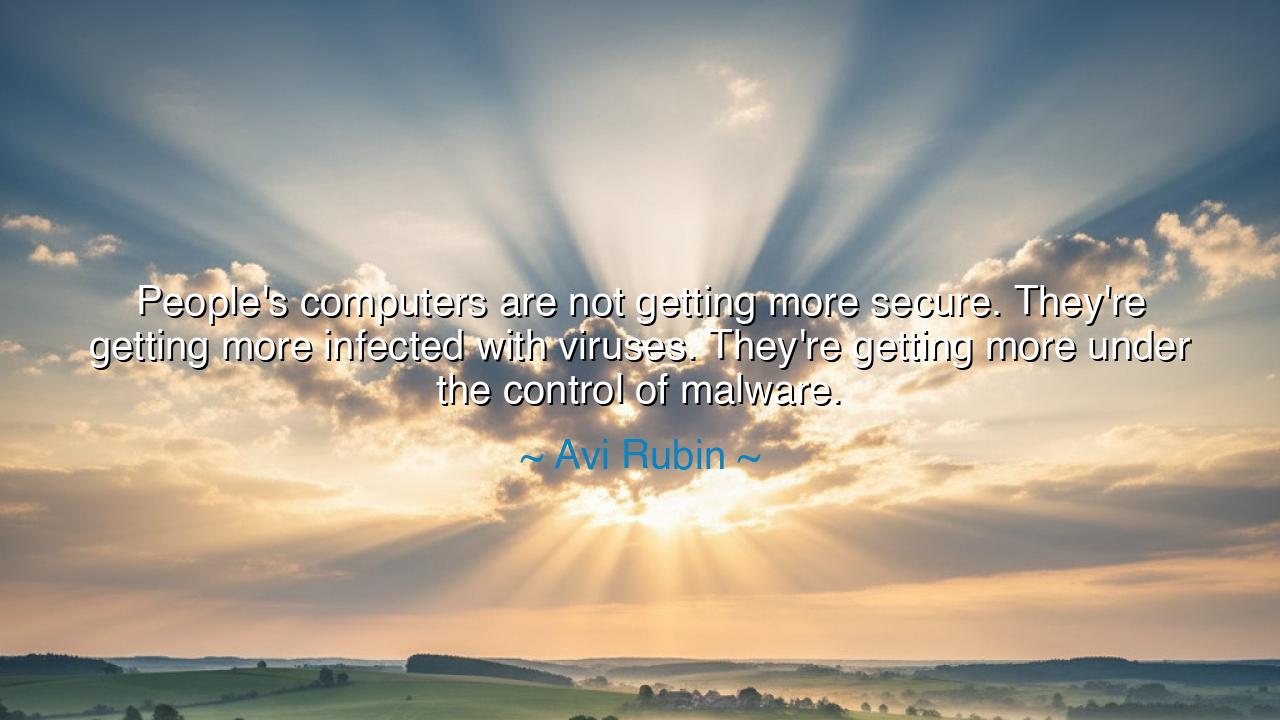
People's computers are not getting more secure. They're getting
People's computers are not getting more secure. They're getting more infected with viruses. They're getting more under the control of malware.






“People’s computers are not getting more secure. They’re getting more infected with viruses. They’re getting more under the control of malware.” Thus spoke Avi Rubin, the modern guardian of the digital realm — a scholar of cyber defense, and a watchman standing at the gates of the virtual world. His words, though technical in form, resound with the timeless echo of a prophet’s warning. Beneath the cold language of computers lies a deeper message about vulnerability, complacency, and the fragility of human creation. For in this age of glowing screens and silent codes, we have built not temples of safety, but fragile fortresses — walls that crumble from within.
In the ancient days, the builders of cities raised great walls to guard against invasion. Yet every fortress, no matter how mighty, held its weakness — a secret passage, a distracted sentinel, a gate left ajar. So too in our time, the new cities we inhabit are not made of stone, but of data. The walls are made not of marble, but of code, and the enemies are unseen: viruses, malware, and the invisible armies of those who seek power through corruption. Rubin, in his wisdom, reminds us that the more we depend on these digital citadels, the more urgent our vigilance must become — for the enemy no longer knocks; it enters silently, cloaked in trust.
Rubin’s words were born in the early years of the twenty-first century, when the world’s heart was awakening to the full power — and peril — of the internet. As a professor of computer science and a pioneer in cybersecurity, he saw what few others could: that every new invention, while expanding human freedom, also opened new doors to enslavement. For every innovation that connects us, there emerges another that controls us. The same wires that carry our voices can carry the commands of unseen masters; the same networks that unite us can be turned into webs that ensnare.
History bears witness to this duality. Consider the tale of Troy, the ancient city thought impregnable, brought to ruin not by brute force but by deception — a wooden horse, a symbol of false gift and hidden danger. So too, the viruses of our age often arrive in disguise — an email promising friendship, a file offered as help, a download masked as delight. What brings destruction is not the sword but trust misplaced. Rubin’s lament — that “people’s computers are getting more infected” — is not merely about machines; it is about the human heart’s tendency to trust too quickly and guard too late.
Yet within his warning, there is also a call to wisdom and responsibility. For Rubin does not speak as one who despairs, but as one who urges the awakening of the mind. He calls upon the modern citizen to be not merely a user of technology, but a keeper of awareness. Just as ancient sailors learned to read the stars to navigate the sea, so must we learn to read the signs of the digital tide — to know when a wave of data carries promise, and when it carries peril. The power to defend is not in walls alone, but in understanding.
But there is another truth hidden in Rubin’s insight — that the weakness of our systems mirrors the weakness of our souls. The viruses that infect machines are born from the same impulses that infect humanity: greed, deception, carelessness, and pride. The more we surrender control of our lives to the convenience of technology, the more we risk surrendering the very sovereignty of our minds. To guard our computers, then, is also to guard ourselves — our focus, our discipline, our independence. For the true malware is not only in the code, but in the complacency that allows it to grow.
So let us learn from Rubin’s warning. Let us treat our tools not as toys but as sacred instruments of creation, deserving of care and respect. Keep your devices guarded, your knowledge sharp, your trust discerning. But more than that — keep your spirit awake. For the ancient battle between light and shadow has now moved to the realm of information, and every keystroke is a spark in that struggle.
And thus, the lesson endures: security is not a state, but a practice; not a wall, but a watchfulness. Whether in the kingdom of flesh or the kingdom of code, the wise know that freedom survives only through vigilance. Therefore, O seeker of wisdom in the digital age, remember: a computer, like a mind, is only as safe as the awareness of the one who commands it. Guard both well — for in guarding them, you guard the future itself.






AAdministratorAdministrator
Welcome, honored guests. Please leave a comment, we will respond soon